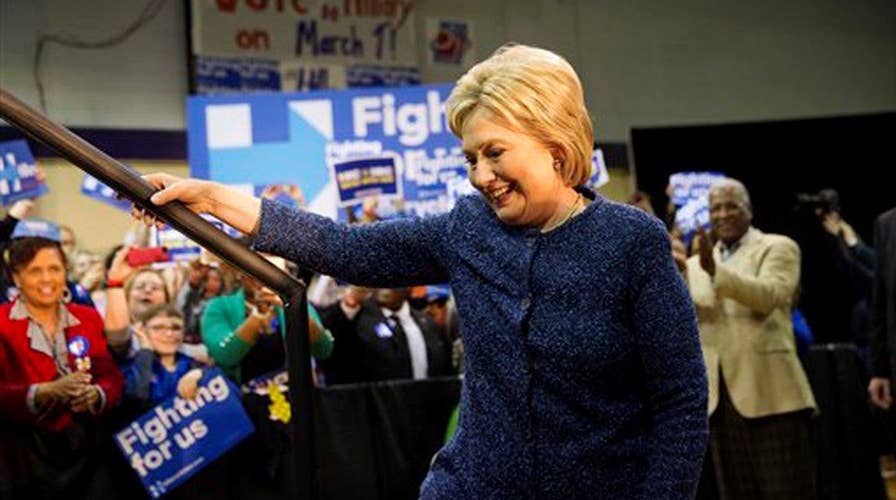Hillary Clinton wins South Carolina Democratic primary
Beats Sanders by large margin in Palmetto State
The inevitability of Hillary Clinton’s road to the nomination began Saturday night.
Now it's official.
South Carolina was not Hillary Clinton’s firewall (that role was played by Nevada). South Carolina will be seen as her launching pad.
After much debate these past few weeks over whether the momentum and message of Bernie Sanders's campaign was powerful enough to win over black voters and decimate the last voting bloc fully committed to Clinton, Saturday's results in South Carolina have settled it. Just as in Nevada where African-Americans voted for Clinton by a margin of three to one, in South Carolina more than 80 percent went for Clinton.
There's no question that the potential success of Clinton's campaign hinges on maintaining this support.
No doubt the South Carolina African-American establishment, led by Representative Jim Clyburn, recognized this and how critical formal endorsements and mobilization for Clinton was. Clyburn remarked in his endorsement that “my heart has been with Hillary Clinton from day 1” - a direct signal to black Americans to think long and hard about which of the candidates has always been present in the black community.
Indeed, this has been the main argument in her favor with officials, pastors and community leaders calling on voters to remember that both the Clintons have been there for them, even if policy results have been mixed. And with 60 percent of Democratic voters on Saturday in South Carolina being African-American – a number that’s even bigger than the 55 percent we saw in 2008 – we can be sure that this approach will be emulated as the campaign continues.
The desperation of the Sanders campaign, to galvanize black voters, proved to be too little, too late. And though Sanders had the support of some notable members of the African-American community supporting him, including Eric Garner's daughter, Spike Lee and Danny Glover, it was woefully insufficient.
On top of that we learned something critical about the Democrat base in this country on Saturday night. they aren’t nearly as hyper-progressive as we’ve been hearing.
Exit polls showed that as astounding 70 percent of South Carolina voters want to continue President Obama’s policies yet only 19 percent want the next president to be more liberal.
This stands in stark contrast to the rhetoric that’s coming out of the Sanders camp from supporters who accuse Obama of not having delivered enough for Democrats and especially blacks.
It follows that Clinton absolutely made the right choice in aligning herself with Obama, who has all but endorsed her. She can certainly claim to be the rightful successor to his foreign policy, but has also made it a point to tout the progress the American economy has made during his presidency.
This is even more important when we take into account that 43 percent of Democratic voters in South Carolina said the economy and jobs were the most important issue to them. This was followed by 22 percent who said health care, 21 percent for income inequality and 10 percent who said terrorism. The economy and jobs is always the most important issue in elections, but not usually by these margins. And polls find that Clinton is consistently trusted over Sanders to handle the economy.
Saturday night Sanders offered that, in the face of defeat, his campaign is just beginning and we didn’t count Clinton out when she lost New Hampshire by over 20 points. He is absolutely right.
But the map doesn’t favor his argument.
On March 1, Super Tuesday, Democrats will vote in 11 states, six of which are expected to see African-American voters turn out in huge numbers.
But that isn’t the only thing working in her favor: Super Tuesday takes us into more conservative territory where voters are apt to be more moderate and positive about the Obama record.
This isn’t to say that Sanders won’t take any states. He should win Vermont with a big victory and he is also looking to grab Oklahoma and Minnesota.
However, it would be hard to argue that this campaign isn’t shaping up strongly in Clinton’s favor. This not only speaks to the appeal of her experience, but runs counter to the narrative that Americans want outsider politicians at any cost.









































